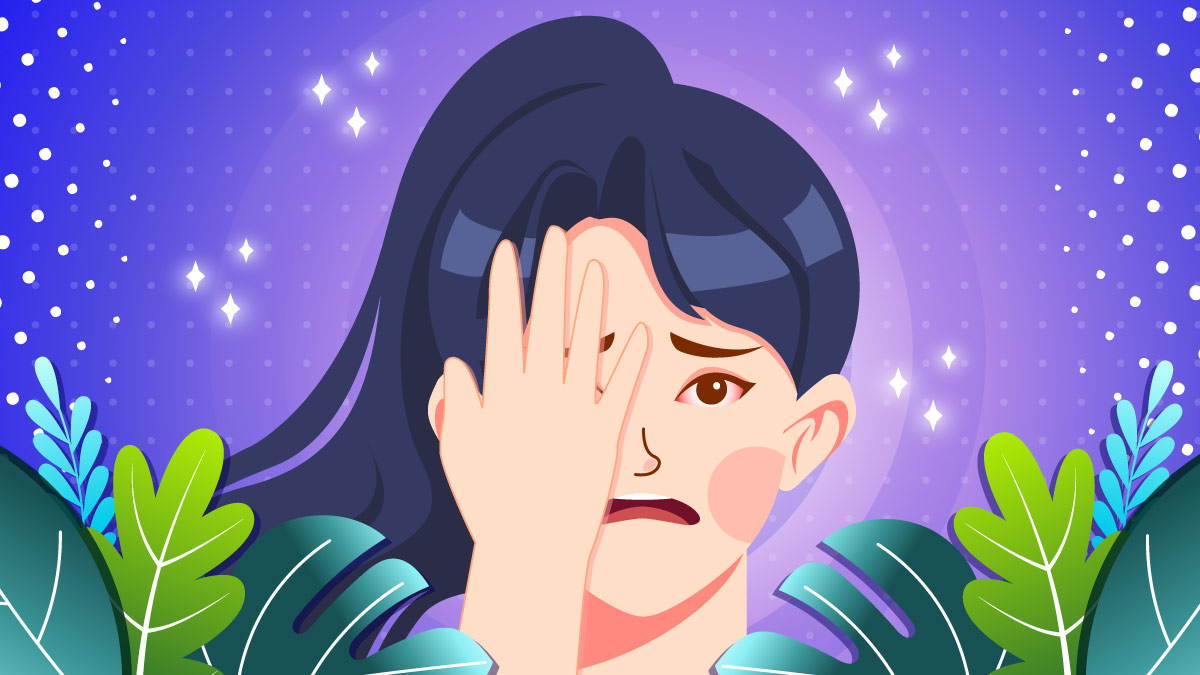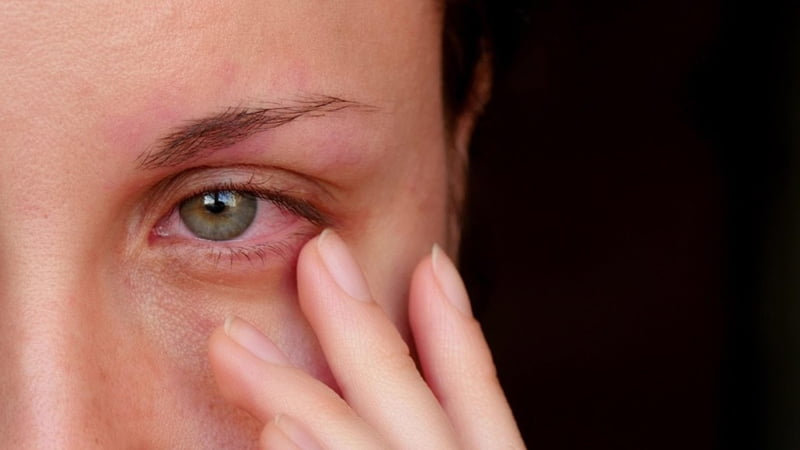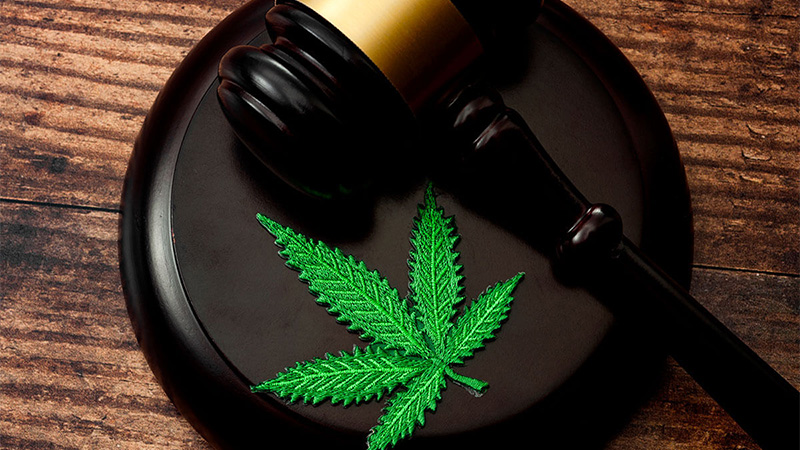Does CBD Make Your Eyes Red?

The stereotypical look of a cannabis user is associated with red, droopy eyes and a goofy smile. While this is true for most novice marijuana smokers, red eyes don’t go hand in hand with CBD use.
In fact, we don’t know any person who would get red eyes after taking CBD oil.
Does it mean that CBD doesn’t make your eyes red at all?
Or is it true only for certain formats and products?
In this article, we compare the effects of CBD and THC on intraocular pressure, explain why you can get red eyes after using a CBD product, and share handy tips for managing this symptom.
Does CBD Make Your Eyes Red?
No, CBD doesn’t make your eyes red because it doesn’t bind to the cannabis receptors that are responsible for this effect.
CBD may reduce the overall blood pressure, but when it comes to intraocular pressure, it doesn’t share the same properties as THC.
Speaking of which, let’s take a look at the real reason why cannabis can make your eyes red.
The Red Eye Effect Comes from THC
THC is the only cannabinoid responsible for giving you red eyes.
Don’t worry, it’s not a negative effect.
On the contrary, red eyes are caused by decreased intraocular pressure, which improves blood flow to the eye by dilating blood vessels. With more blood being pumped to your eyes, they start to turn red.
That’s why cannabis smokers often have red eyes after a few puffs. The intensity of this effect depends on your tolerance and your body’s unique chemistry, but it’s a common phenomenon among cannabis users.
However, this isn’t the only difference between CBD and THC.
Here we shed more light on both cannabinoids.
The Difference Between CBD and THC
CBD and THC have a lot of similar therapeutic properties. Both can be used to alleviate a wide range of ailments, both physical and psychological.
That being said, their effects on the brain are completely different:
CBD
CBD is a non-intoxicating cannabinoid, meaning it won’t get you high. That’s because CBD doesn’t interact with cannabinoid receptors in the brain. Instead, it enhances their signaling by interacting with the enzymes and neurotransmitters in the endocannabinoid system (ECS) — the major regulatory network in all mammals. Although CBD doesn’t make your eyes red or induce euphoria, it allows you to relax, reduce anxiety, and alleviate pain. It also has remarkable anti-inflammatory, antioxidative, and neuroprotective effects on the brain.
THC
Cannabis has been consumed for thousands of years for its medicinal and psychoactive properties. It binds to cannabinoid receptors in the brain, leading to feelings of euphoria, deep relaxation, elevated mood, sharpened senses, and altered perception of time. From a medicinal perspective, THC has the potential to relieve pain, depression, insomnia, and assist in the treatment of cancer, autoimmune disorders, and neurodegenerative diseases. Higher doses of THC carry a risk of inducing anxiety and paranoia, which are caused by the biphasic nature of this compound.
How Does CBD Work in the Body?
As mentioned, THC and CBD look similar at first glance. But when you examine them more carefully, you’ll notice that they use different mechanisms to achieve their effects.
One of the most noticeable differences is the chemical makeup of CBD, which comes with an extra layer of hydrogen — allowing the user to enjoy the myriad of benefits of using cannabis without disrupting cognitive capacity.
CBD is indirectly related to the endocannabinoid system. It helps optimize its functioning by enhancing the activity of cannabinoid receptors and endocannabinoids.
People usually take CBD for anxiety, depression, pain, autoimmune diseases, and neurological conditions.
However, the dilation of blood vessels and the red-eye effect aren’t part of its effects.
Why Do Marijuana Users Have Red Eyes?

The main reason why marijuana makes your eyes red is the effect of THC on blood flow to the eyes. The higher the THC potency in your strain, the greater the effect.
Your eyes may also become red from tobacco smoke, but this comes as a result of irritation rather than the dilation of blood vessels. If you combine cannabis with tobacco, the bloodshot eye may be even more visible.
CBD Doesn’t Make Your Eyes Red: Watch Out for Scams
If you’ve consumed a CBD product and got red eyes afterward, you should check if your product comes from hemp or marijuana. Many CBD products sold online and locally are mislabeled, so there’s a risk of cross-contamination with THC.
Not only can such CBD products make your eyes red, but they can also get you into trouble with the law. CBD extracts with a THC content above 0.3% are considered ‘marijuana’ and classified as Schedule I drugs (federally illegal).
Always get your CBD oils from reputable manufacturers who provide updated, third-party lab reports for every product they offer.
How to Manage Red Eyes After Cannabis
Smoking marijuana, consuming marijuana-derived CBD oil, or smoking CBD hemp flower with tobacco can give you red eyes. While not negative per se, the redness and dryness can cause unnecessary discomfort.
Here’s how you can deal with this effect:
- Use a vasoconstrictor: certain foods, such as chocolate, can constrict blood vessels in the eyes, reducing their redness.
- Take eyedrops: putting eyedrops in your eyes will reduce the dryness and redness by relieving inflammation in the irritated spot.
- Wait until the effect wears off: red eyes won’t linger forever. Sometimes, you need to be a bit patient, and red eyes will go away. In the meantime, don’t expose yourself to the sun for a few hours, as it can further irritate your eyes.
Are Red Eyes A Good or Bad Sign?
Many people are afraid of getting red eyes after taking CBD oil. While this won’t happen with a legitimate CBD product, the fact that marijuana makes your eyes red isn’t anything bad.
It’s actually a good sign because THC relieves intraocular pressure. When this pressure builds up in the eye, it can cause pain and nerve damage, resulting in glaucoma.
That’s why doctors prescribe medical marijuana to glaucoma patients.
However, smoking marijuana only provides short-term relief; it’s better to eat a cannabis-infused edible and enjoy the reduction of blood pressure for up to 10 hours.
Is CBD Legal?

Yes, CBD is legal in all 50 states, but it must come from hemp and contain 0.3% of THC or less. Hemp-derived products were legalized by the 2018 Farm Bill; since then, CBD has been classified as a novel food or health supplement.
Will Smoking CBD Make Your Eyes Red?
Smoking CBD hemp flower shouldn’t make your eyes red as long as it contains only a trace amount of THC. Some people are allergic to certain terpenes in hemp, so if your strain causes red eyes, switch to another strain.
And don’t mix CBD with tobacco. It will ruin the taste of your spliff, not to mention the obvious health risks of smoking tobacco.
CBD and Red Eyes: FAQ
Still not sure if CBD will make your eyes red and lower than your profile? These three questions will dispel your doubts:
1. Does CBD Affect Your Eyes?
The effects of CBD on the eyes are under-researched, but since CBD counteracts many effects of THC, it’s possible that it might worsen existing symptoms of glaucoma. However, this was shown only in one study; we need more quality research to conclude the effects of CBD on intraocular pressure.
2. Can CBD Help with Cataracts?
There’s not enough evidence to confirm that CBD might help with cataracts. The condition appears to stem from oxidative stress, and the impact of CBD on oxidative stress and inflammation is well-researched. However, no study has yet touched on the subject of using CBD for cataracts.
3. What Are the Side Effects of CBD?
CBD has a favorable safety profile. It comes with a few mild side effects, most of which are nonexistent in regular doses. At present, CBD is known to cause dry mouth, changes in appetite, sedation, and diarrhea when consumed in excessive amounts.
CBD can also negatively interact with many prescription medications. Always talk to your doctor before adding CBD oil or to your regime.
CBD and Red Eyes: Bottom Line
CBD doesn’t make your eyes read because it doesn’t use the same mechanism as THC.
In fact, the effects of both compounds on the intraocular pressure are completely different.
If you’re worried about getting red eyes after taking CBD oil, know this — as long as you’re using a lab-tested product, you shouldn’t get this effect.
And if you experience red eyes after consuming marijuana, don’t worry, it’s actually a good sign because THC relieves pressure from them — preventing nerve damage and reducing the risk of glaucoma.
We hope this article has helped to address the question of whether or not CBD makes your eyes red. Always make sure to choose lab-tested products so that you reap the benefits without the bloodshot eye effect.